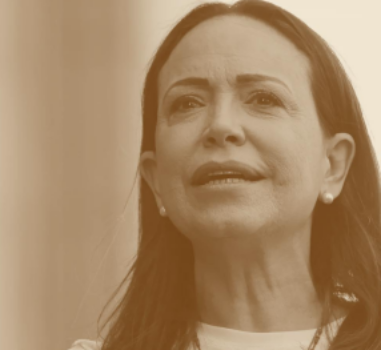Leia, comente compartilhe
Por José Roberto de Souza Dias
Two Flags Post – Edição Internacional
O Prêmio Nobel da Paz concedido a Maria Corina Machado ressoou no mundo como uma lufada de esperança em meio ao ar rarefeito da política latino-americana. Em menos de vinte e quatro horas, o nome da líder venezuelana, tantas vezes perseguida e silenciada, transformou-se em símbolo universal de resistência democrática. A decisão do Comitê Norueguês do Nobel transcende o gesto humanitário, é um ato político de proporções geoestratégicas. No tabuleiro do poder global, o prêmio reposiciona a América Latina como território de disputa simbólica entre a liberdade e o autoritarismo.
A escolha de Maria Corina não foi neutra. Em um continente onde a repressão se disfarça de legalidade e a censura se apresenta como proteção institucional, homenagear uma mulher que enfrentou o regime de Nicolás Maduro é reafirmar o valor universal da coragem civil. A mensagem que parte de Oslo ecoa muito além das fronteiras venezuelanas. Ela alcança Havana, Manágua, La Paz e Brasília, onde governos de vocação autoritária, ainda que revestidos de formalidades democráticas, observam com desconforto o significado desse gesto. O Nobel é, afinal, uma sentença moral, separa os que acreditam na força da liberdade daqueles que se acostumaram à conveniência do silêncio.
A Venezuela de Maduro representa o autoritarismo explícito, o Brasil, seu reflexo disfarçado. No mesmo continente em que María Corina é premiada por defender a palavra, o governo brasileiro constrói leis para controlá-la. Sob o pretexto de combater a desinformação, consolida-se um sistema de vigilância digital e de intervenção sobre o discurso público. É a velha tentação latino-americana de regular o pensamento, não mais com tanques, mas com algoritmos e canetas.
O contraste é inevitável. Enquanto Maria Corina arrisca a própria vida para denunciar uma ditadura, o governo brasileiro prefere omitir-se diante dela. O silêncio brasileiro diante da honraria é mais que diplomático, é sintomático. Ele revela o desconforto de um país que, temendo compromissos com a verdade, abriga-se na ambiguidade e evita olhar para o espelho da história.
A história, no entanto, ensina que há momentos em que a omissão pesa tanto quanto a tirania. O Nobel concedido à opositora venezuelana não é apenas uma homenagem individual, é um espelho erguido diante das nações que confundem prudência com covardia. Diante dele, o Brasil vê refletida a distância entre o que proclama e o que pratica, e talvez perceba, se ainda houver tempo, que a liberdade não se defende com discursos, mas com atitudes.
The Nobel, Maria Corina, and Brazil’s Mirror
The Nobel Peace Prize awarded to Maria Corina Machado echoed around the world as a breath of hope amid the thin air of Latin American politics. In less than twenty-four hours, the name of the Venezuelan leader, so often persecuted and silenced, became a universal symbol of democratic resistance. The decision of the Norwegian Nobel Committee goes beyond a humanitarian gesture; it is a political act of geostrategic proportions. On the global chessboard, the award repositions Latin America as a symbolic battleground between freedom and authoritarianism.
The choice of Maria Corina was far from neutral. In a continent where repression is disguised as legality and censorship is presented as institutional protection, honoring a woman who faced the regime of Nicolás Maduro reaffirms the universal value of civic courage. The message that comes from Oslo resonates far beyond the borders of Venezuela. It reaches Havana, Managua, La Paz, and Brasília, where governments with authoritarian tendencies, even when cloaked in democratic formalities, look uneasily at the meaning of this gesture. The Nobel Prize is, in essence, a moral verdict that separates those who believe in the power of freedom from those who have grown accustomed to the convenience of silence.
Maduro’s Venezuela represents explicit authoritarianism, and Brazil, its disguised reflection. On the same continent where María Corina is honored for defending the word, the Brazilian government is building laws to control it. Under the pretext of combating disinformation, a system of digital surveillance and intervention over public discourse is taking shape. It is the old Latin American temptation to regulate thought, not with tanks, but with algorithms and pens.
The contrast is inevitable. While Maria Corina risks her life to denounce a dictatorship, the Brazilian government prefers to remain silent before it. Brazil’s silence in the face of this honor is more than diplomatic; it is symptomatic. It reveals the discomfort of a country that, fearing the cost of truth, takes refuge in ambiguity and avoids facing its own reflection in the mirror of history.
History, however, teaches that there are moments when omission weighs as heavily as tyranny. The Nobel Prize granted to the Venezuelan opposition leader is not only an individual tribute; it is a mirror raised before nations that confuse prudence with cowardice. Before that mirror, Brazil sees reflected the distance between what it proclaims and what it practices, and perhaps it will realize, if there is still time, that freedom is not defended with speeches, but with actions.



Belíssima interpretação do atual cenário geopolítico internacional. Bem assim, a altura de u. Mestre Universal… como sempre preparado para enfrentar esse palco tão contundente que envolve bilhões de pessoas…preparado sim, para trabalhar com o plano do Pai na terra. Assim sendo, sempre juntos …em familia…nas mesmas linhas de pensamentos, unidos com o Pastor…atravessarem o portal da Ursa Maior e ascenderamos ao nível das inteligências estelares superiores.
Não há diferença alguma entre o Brasil e a Venezuela. Do ponto de vista lato sensu. Porque do ponto de vista estricto sensu há quilômetros de diferença. Lá o poder é declarado, tomado; aqui ele é tomado de roldão, disfarçado, caricaturado de legalidade. Lá, tá na cara; aqui tá na penumbra. A igualdade é que tanto Lá quanto cá, todo mundo sabe a verdade. A prêmio Nobel pode mudar tudo.